Related Research Articles

Dimple Kapadia is an Indian actress predominantly appearing in Hindi films. Born and raised in Mumbai by wealthy parents, she aspired to become an actress from a young age and received her first opportunity through her father's efforts to launch her in the film industry. She was discovered at age 14 by the filmmaker Raj Kapoor, who cast her in the title role of his teen romance Bobby (1973), which opened to major commercial success and gained her wide public recognition. Shortly before the film's release in 1973, she married the actor Rajesh Khanna and quit acting. Their daughters, Twinkle and Rinke Khanna, both briefly worked as actresses in their youth. Kapadia returned to films in 1984, two years after her separation from Khanna. Her comeback film Saagar, which was released a year later, revived her career. Both Bobby and Saagar won her Filmfare Awards for Best Actress. Through her work over the next decade, she established herself as one of Hindi cinema's leading actresses.
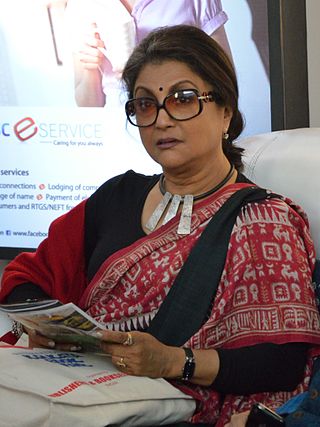
Aparna Sen is an Indian film director, screenwriter and actress who is known for her work in Bengali cinema. She has received several accolades as an actress and filmmaker, including nine National Film Awards, five Filmfare Awards East and thirteen Bengal Film Journalists' Association Awards. For her contribution in the field of arts, the Government of India honoured her with Padma Shri, the country's fourth highest civilian award.

Utpal Dutt was an Indian actor, director, and writer-playwright. He was primarily an actor in Bengali theatre, where he became a pioneering figure in Modern Indian theatre, when he founded the "Little Theatre Group" in 1949. This group enacted many English, Shakespearean and Brecht plays, in a period now known as the "Epic theatre" period, before it immersed itself completely in highly political and radical theatre. His plays became an apt vehicle for the expression of his Marxist ideologies, visible in socio-political plays such as Kallol (1965), Manusher Adhikar, Louha Manob (1964), Tiner Toloar and Maha-Bidroha. He also acted in over 100 Bengali and Hindi films in a career spanning 40 years, and remains most known for his roles in films such as Mrinal Sen’s Bhuvan Shome (1969), Satyajit Ray’s Agantuk (1991), Gautam Ghose’s Padma Nadir Majhi (1992) and Hrishikesh Mukherjee's breezy Hindi comedies such as Gol Maal (1979) and Rang Birangi (1983). He also did the role of a sculptor, Sir Digindra Narayan, in the episode Seemant Heera of Byomkesh Bakshi on Doordarshan in 1993, shortly before his death.

Anjan Dutta is an Indian film director, actor, and singer-songwriter known for his work in the Bengali alternative music genre anyodharar gaan . As an actor, Dutta began his career in Bengali cinema in the Mrinal Sen film Chalachitro, for which he won the best newcomer actor award at the Venice Film Festival. He acted in Aparna Sen's hit film, Mr. and Mrs. Iyer. In 2018 he featured in Swapnasandhani's new play Taraye Taraye, as Vincent van Gogh, under the direction of Kaushik Sen.
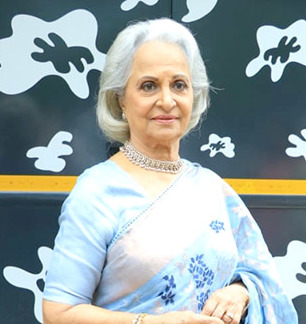
Waheeda Rehman is an Indian actress. Regarded as one of Hindi cinema's most accomplished actresses, she has worked in more than 90 feature films, in a career spanning over five decades. Her accolades include a National Film Award and three Filmfare Awards. She was honoured with India's civilian awards; the Padma Shri in 1972 and the Padma Bhushan in 2011. In 2021 she was honoured with the Dadasaheb Phalke Award, India's highest award in the field of cinema, but was awarded in 2023.
Simple Kapadia was a Hindi film actress and costume designer, who was active in her professional career from 1987 until her death in 2009.

Sahib Bibi Aur Ghulam is a 1962 Indian Hindi-language drama film that was directed by Abrar Alvi and produced by Guru Dutt, who also co-stars in it alongside Meena Kumari, Rehman, and Waheeda Rehman. The film, which is based on Bimal Mitra's Bengali-language novel Saheb Bibi Golam (1953) which was the second adaptation of the novel after the 1956 Bengali film with the same title Saheb Bibi Golam starring Sumitra Devi, Uttam Kumar and Chhabi Biswas. Having seen the novel and its staged version, Dutt wanted to adapt Saheb Bibi Golam into a film, was set in the 19th century during the British Raj and focuses on Bhoothnath (Dutt), who meets Chhoti Bahu (Kumari), the lonely wife of a zamindar (Rehman). The film follows Chhoti Bahu's effort to keep her husband—who likes drinking and watching tawaifs perform—at their home by drinking with him. She becomes addicted to alcohol, leading both of them into bankruptcy.
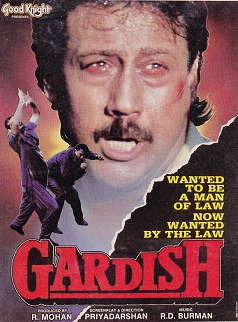
Gardish (transl. Adversity/misfortune) is a 1993 Indian Hindi-language action crime film written and directed by Priyadarshan, starring Shammi Kapoor, Jackie Shroff, Aishwarya, Dimple Kapadia and Amrish Puri. It is a remake of the 1989 Malayalam film Kireedam. The film won two Filmfare Awards—Best Art Direction and Best Action (Thyagarajan), and was nominated for Best Actor (Shroff), Best Supporting Actor, and Best Supporting Actress (Kapadia). It marks the debut of actor Mukesh Rishi as an antagonist and Aishwarya's Bollywood debut.
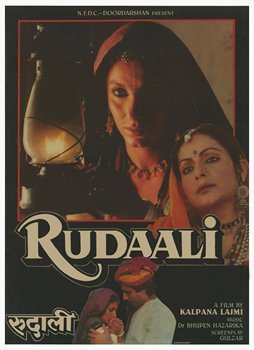
Rudaali is a 1993 Indian Hindi-language drama film directed by Kalpana Lajmi, written by Lajmi and Gulzar and based on a 1979 short story of the same name by Bengali author Mahasweta Devi. Set in a small village in Rajasthan, the film stars Dimple Kapadia as Shanichari, a lonely and hardened woman who, despite a lifetime of misfortune and abandonment, is unable to express grief through crying and is challenged with a new job as a professional mourner. Raakhee, Raj Babbar, and Amjad Khan appear in supporting roles. Produced by the National Film Development Corporation of India and Doordarshan, the film was labelled part of India's neo-realist parallel cinema, but it employed several of the common elements of mainstream Hindi cinema, including songs composed by Bhupen Hazarika.

Roopa Ganguly is an Indian actress, playback singer and politician. She is best known for her portrayal of Draupadi in B R Chopra's hit television series Mahabharat. Often promoted as the Tollywood's answer to Bollywood's Shabana Azmi, she is known for her versatility and accent adaptation. She has worked with directors such as Mrinal Sen, Aparna Sen, Goutam Ghose and Rituparno Ghosh. She is a trained Rabindra Sangeet vocalist and a classical dancer. She received several awards including a National Award and two BFJA Awards. In October 2016, she was nominated as a Member of Parliament, Rajya Sabha, by the President of India. She served as the President of BJP Mahila Morcha in West Bengal. She served as the General Secretary and the Vice-President for the West Bengal Motion Picture Artistes' Forum, a body representing cine artistes. Her films have commulatively grossed more than US$100 million worldwide.
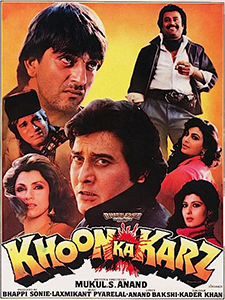
Khoon Ka Karz is a 1991 Indian Hindi-language action crime film directed by Mukul S. Anand. It stars Vinod Khanna, Rajinikanth, Sanjay Dutt, Dimple Kapadia, Kimi Katkar, Sangeeta Bijlani and Kader Khan. The film deals with three individuals who are arrested for infringements under the Indian Penal Code: Karan, Kishan (Rajinikanth) and Arjun recount to the court how two of them were adopted and nursed by a saintly woman and how they fall in love with three women. It was dubbed and released in Tamil as Arasan: The Don in 2009, eighteen years after its original release.
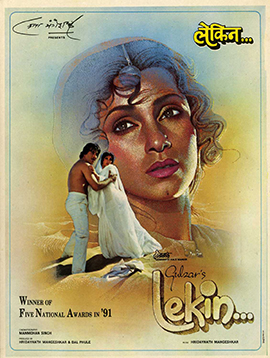
Lekin... (transl. But...) is a 1991 Hindi drama mystery film, loosely based on the 1895 short story Kshudhit Pashaan by Rabindranath Tagore and directed by Gulzar. It stars Vinod Khanna, Dimple Kapadia, Amjad Khan, Alok Nath, and Beena Banerjee, and features a special appearance by Hema Malini. The film tells the story of Reva, a restless ghost who seeks liberation and haunts the ancient palace of Raja Param Singh in Rajasthan when she is discovered by Sameer, a museum curator sent by the government to salvage valuables in the region. As she recreates a visual representation of the history of the palace which reveals her tragic story, Sameer becomes determined to help set her free.
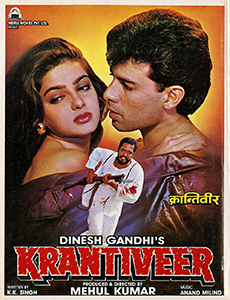
Krantiveer is a 1994 Indian Hindi-language action crime film directed and produced by Mehul Kumar. The film stars Nana Patekar, Dimple Kapadia, Atul Agnihotri, Mamta Kulkarni in the lead roles. Farida Jalal, Paresh Rawal, Tinu Anand, Danny Denzongpa are in supporting roles. It became the third highest-grossing film of the year, additionally winning three Star Screen Awards, four Filmfare Awards and one National Film Award.
Zakhmi Aurat is a 1988 Indian Hindi drama movie starring Dimple Kapadia and Raj Babbar and directed by Avtar Bhogal. Kapadia played Kiran Dutt, a police officer who is subject to gang rape and, when the judicial system fails to convict the criminals, unites with other rape victims to castrate the rapists in revenge.
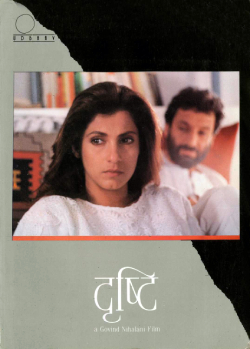
Drishti (transl. Vision) is a 1990 Indian Hindi-language drama film directed by Govind Nihalani, starring Dimple Kapadia, Shekhar Kapur and Irrfan. The film depicts the marital life of an urban couple from an upper-class milieu in Mumbai and follow their trials and tribulations, infidelity, divorce, and meeting after years of separation.

Ranjana Ami Ar Ashbona is a 2011 Bengali language Indian rock musical drama film directed by Anjan Dutt. It won three national film awards in 2011 including best music direction and best feature film in Bengali.

Churni Ganguly is an Indian actress and director who mainly works in Bengali movies and television productions. She received the Bengal Film Journalists' Association Awards in 2005 in the best actress category for the movie Waarish, in which she played a single-mother's role. She won two National Film Awards for her directorial ventures Nirbashito and Tarikh.

Neel Dutt is an Indian composer and singer from Kolkata. He received the National Film Award for Best Music Direction from the Govt. of India in 2012 for the soundtrack of the Bengali film Ranjana Ami Ar Ashbona. Dutt is the third person from West Bengal to win the Best Music Direction award. He is arguably the first music director in India to rearrange a Rabindranath Tagore composition with modern electronic music.

Dutta Vs Dutta is a 2012 Indian Bengali film directed by Anjan Dutt. This is Anjan Dutt's semi-autobiographical film. Most of the film has been shot in a house of Amherst Street in Kolkata. Anjan has described this house resonated feel of his old house of Beniapukur.

Dimple Kapadia is an Indian actress who predominantly appears in Hindi films. She was discovered by Raj Kapoor at age 14, who gave her the title role in his teen romance Bobby (1973), opposite his son Rishi Kapoor. The film became a massive commercial success and made her an overnight star. Her role as a Christian teenager from Goa established her as a youth fashion icon and won her the Filmfare Award for Best Actress. Kapadia retired from acting following her marriage to Indian actor Rajesh Khanna earlier in 1973, and returned to the film industry in 1984, after her separation from Khanna. The release of her comeback film, Saagar, was delayed, with Zakhmi Sher becoming the second film of her career. Released in 1985, Saagar earned her a second Best Actress award at Filmfare, and she went on to establish herself as one of the leading actresses of Hindi cinema in the 1980s and early 1990s. The early roles she played following her return included the Hitchcockian thriller Aitbaar (1985), for which she received positive reviews, and the commercially successful action films Arjun (1985) and Janbaaz (1986). During this period, she acted in several films in South India, which she admitted to having made for financial gain and dismissed their quality.
References
- 1 2 "41st National Film Awards" (PDF). Directorate of Film Festivals.
- ↑ "Bollywood Hindi Movie, Latest Movies Release, Review & News, Actor Actress Photo Pics & Videos Gallery". Gomolo.com. Archived from the original on 14 August 2012. Retrieved 27 October 2012.
- ↑ Rajadhyaksha, Ashish; Willemen, Paul (1999). Encyclopaedia of Indian cinema. British Film Institute. ISBN 9781579581466.
- ↑ Das Gupta, Ranjan (8 November 2009). "I am very moody". The Hindu . Archived from the original on 11 November 2009. Retrieved 27 October 2012.
- ↑ Anatreen Rotten Tomatoes.